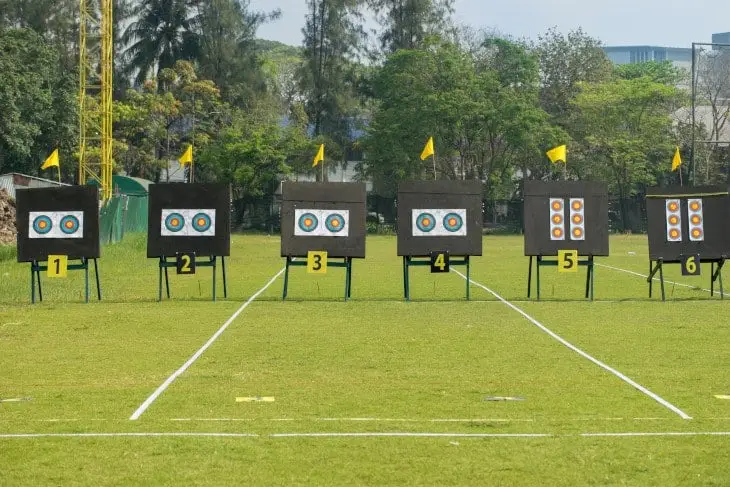
Archery can be a lifelong passion, but as with all life-long passions, sometimes you’ll experience some “dips” in your enthusiasm.
If that describes your experience, don’t feel bad—it’s totally normal! Practice can be tough, and it can be difficult to maintain excitement throughout the days and months of years of practice.
To help you out, we’ve put our heads together and come up with the following tips on how to maintain your archery practice. In other words, how to keep you improving your skills, even when you’d rather watch TV or take a day off.
The first one seems simple, but it’s actually a REALLY effective tool:
Make Practice Part of Your Weekly Routine
We tend to think of a “routine” as a negative—the word invokes the idea of a commonplace task or a boring repetition. In other words, something to avoid.
The truth is, however, that there’s a great deal of power in routine. A well-developed routine gets you up out of bed at a certain time each day, eating the same foods every day, gets you on your way to school/work at a certain time, and gets you through your day—even when you don’t necessary want to get out of bed and be on your way to work/school. That’s incredible, if you think about it.
The force of routine is actually really powerful, and in fact, some of the world’s most successful business leaders rely on routines in order to make sure they remain effective and consistent. They make sure that their daily routines get them closer to their goals—whatever those goals may be.
So how can you use that to develop your archery skills? Well, you make archery practice part of daily habits. If you’re an early riser and you’ve got a target in the yard, spend ten minutes shooting ends before you jump in the shower or eat your breakfast. If you usually go to the range after a stressful day at work, make it a point to stop in every day for a few minutes before you end your day. Whatever your personal routines are, figure out a way to incorporate archery practice into the middle of it.
If it’s works for CEOs, political leaders, and other people influential people, it can work for you!
Join a League
This is probably our most powerful piece of advice if you want to improve your archery skills: find a league and join it. It is perhaps the best way to commit to archery and build your abilities.
A league is a special thing, because it’s actually a bunch of different motivating factors put together: it’s a social event, which means that you’ll be build relationships that will make you want to go back and keep practicing, but it’s also a competitive event, so you may build rivalries and find yourself trying to improve over your teammates. It’s also a routine, because leagues tend to practice at the same time and the same place every week, and skipping a practice or a competitive event will let your teammates down, so you’re more likely to go. It’s an incredibly powerful way to build your abilities as an archery.
You may be a little intimidated to meet new people, and that’s fine—you can do it. You may be worried that the other archers will be above your level—and that’s fine too. You can practice and get better. The important thing is to get involved and make it happen.
Join a Competition
Leagues are probably better, but if there are none in your area, signing up for a competition—and then practicing for that competition—can be a good alternative. When you have a goal to work for, you can keep it in mind and practice—even when you don’t want to.
Here’s the trick: you need to believe that you can be competitive. If you think that you don’t really have a chance to rank, you probably won’t take it seriously. You need to believe you can actually rise to the challenge, and when you do that, a competition can be a powerful force for improvement.
So, be honest with yourself! If you’re an intermediate archery, join a competition where there will be some stiff competition—but if you’re a beginner, join a beginner competition. You may be more hopeful about your performance, and you may be more motivated to learn.
Set Development Goals for Yourself
There are a lot of sports where improvement is a little more “nebulous”—meaning, that improvement is difficult to measure. If you’re a baseball player or a diver or a tennis player, it can be difficult to tell exactly how much you’ve improved. You may be able to tell you’re getting better, but you may not be able to know exactly how much.
That’s not the case for archers! We operate in a sport that is implicitly numbers-based. Once you learn how to score your results, you can keep records and know EXACTLY how much you’re improving over time. If you’re a “numbers guy” or “numbers gal,” this can be a pleasant project in-and-of itself.
Of course, you may find that your average scores go down over time, in which case you definitely need to practice more!
This leads us to our next tip:
Graph Your Results
We got this tip from a reader, and we’ve found it to be very worthwhile: gather your results over a period of time, and graph them. Having a visual representation of your advancement can be very motivating, and the act of making a graph forces you think about your improvement, and how you can “improve improving.”
It doesn’t have to be fancy—using Microsoft Excel can be great, but not everyone has that—so a simple homemade graph made with marker and construction paper will do the trick, and if you’ve got kids, it can be a great opportunity to teach them how to make visual representations of results. Win win!
Make an Archery Range at Home
This isn’t an option for everyone—we get a lot of emails from archers who live in urban environments and do the majority of their practice at a local range—but if you can build a target on your property, your opportunities to practice skyrocket.
You have your own archery range, in your yard, and you can practice anytime you want—but more importantly, you can practice for as long as you want. If you’ve got 10 minutes, that’s ten minutes of practice right there. If you’ve got a whole afternoon to practice, you can log in a couple of hours. When you’re able to schedule your own time to shoot, it basically makes practice an anytime-you-want-it option.
And, best of all… once you set it your target and make sure it’s safe, there are no more costs involved! Because, as any dedicated urban archer will tell you, those range fees add up 😉
One final tip: make sure you check with local authorities that you’re allowed to set up a target. There are plenty of towns / homeowners’ associations / local ordinances that disallow setting up a target shooting some arrows, so you want to be sure you’re good to go before you buy a target and set up a range.

Pay Your Range in Advance
As we mentioned, setting up a home target isn’t an option for everyone, and in that case, it’s off to the range you go. Most ranges are pretty affordable—after all, they want you to visit!—but for most of us, money can be an issue.
There are two bits of advice we give, when it comes to cash:
1) If there’s any kind of “package deal” that saves you money, check it out. Not only will it motivate you to go and make good on the money you’ve spent, but it can save a lot in the long run. Here’s how: a lot of ranges charge a per-visit fee, but plenty of them charge monthly or seasonal dues and you can save a LOT of money by utilizing them. For example, there may be a range near you that charges $10 per visit or $100 per month. If you were to go 20 days in a month a paid $10 every time you went, it would run you $200… but if you signed up for the $100 monthly deal and went 20 days in a month, your per-visit cost would be $5 per visit, and you’d have saved $100. That’s awesome.
2) If there’s no such “package deal,” see if you can pay your local range in advance, and book visits throughout the upcoming month. Not only will you have scheduled time to practice—you’ll have already paid for it! Nothing motivates people like making good on their money.
Get an “Accountability Partner”
This is very common for people in support groups, or other organizations where people want to hold themselves to particular actions: get an “accountability partner” who has similar goals. For archery, you’d want to find someone who also wants to develop his or her skills as an archer, and is willing to commit to some sort of daily practice.
This sounds a little silly, but people who commit to accountability partners attest to how powerful it can be. Social ties are incredibly potent, and most people don’t want to let others down—and so having someone to practice with, who is depending on you—can keep you on the straight-and-narrow, and create a relationship where your practice is not only important for you, but important for the person relying on you.
It can help to think of “accountability partners” a sort of a coaching relationship, where you’re there to help each other—you’re co-coaching each other, in a sense. People often find that having an accountability partner motivates them—but also that the act of motivating someone else is very satisfying, and that gets them going.
Watch Your Favorite Archery Movies to Stay Motivated
Have you ever seen a movie about archery and gotten REALLY pumped about heading out the range? Well, it can’t hurt to have a few movies “in reserve,” to get you motivated when you’re in a slump. Save them up for when you’re not so excited to head out, and give them a watch to get yourself going.
There have been some INCREDIBLE archery movies over the years, and just off the top of our heads, we’d recommend Robin Hood, Prince of Thieves, Avengers: Age of Ultron, Mulan, Robin Hood (the one with Russell Crowe), Deliverance (adults only—it has very mature themes, and it’s not for the kids!), The Host (a great Korean horror movie—also not for kids!), Rambo, The Lord of the Rings, Blade: Trinity, and, of course, The Hunger Games. All fantastic and all motivating, in our humble experience.
Switch Up Your Style of Archery
People often get sucked into a very particular type of archery: some folks are outdoor 3D archers, others dive into Olympic recurve archery, while others focus on indoor competitions with compounds. It’s interesting how people tend to get into a certain style of archery, and never switch it up—ever, at all.
If that’s you, we’d urge you to branch out of a little bit, especially if you’re having trouble maintaining your archery practice. Not only can it help you develop your skills in a new type of archery, but it can also give you a little break and make you appreciate your primary style again. Sometimes a little time away can provide huge gains in surprising ways.
Switch Your Type of Bow
If you have any experience with archery at all, you know first-hand that it is a gear-heavy sport. That can be a bit of a pain, because there’s so much you need to get started, and it can take a long time to figure out how to use everything.
On the flip side, however, all that gear—and all those bows—are a great way to keep archery fresh and exciting. Think of all the different bows you can use and become proficient with, and you’ll get an idea of how archery can be a life-long pastime that keeps your interest over the course of many years: you’ve got traditional recurves, Olympic recurves, competition compounds, hunting compounds, longbows, yumi bows, horsebows, and more.
Each of these are unique and challenging, and if you find your archery practice fading a little bit, give one of them a try—sometimes using a new tool can give you insight into the one you already know very well, and that can be a very motivating factor.
How Else Can You Maintain Your Archery Practice?
Have you got any ideas? We’re all ears. Head over to our “Contact” page and drop us a line about what keeps you going. We’d love to know what works for you, and we’d love to share your experiences!
If you’re flagging in your commitment to improvement, hang in there. It’s amazing how much people can improve when they commit to practice, so keep it, and all the best to you!




